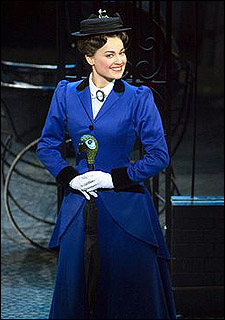
*
Adapting a beloved movie musical for the stage is risky business. Broadway is littered with the good intentions of talented people who were unable to find the theatrical equivalent of cinematic magic.
Mary Poppins is one of those rare exceptions. When the show opened on Broadway in 2006, Michael Kuchwara, critic for the Associated Press, wrote, "It's a lavish stage version that's a wonder to behold, yet at its heart, Mary Poppins is a family drama. That this human and humane story shines through the dazzling special effects demonstrates the potency of its emotional impact."
From the outset, the stellar creative team headed by producers Cameron Mackintosh and Disney Theatricals' Thomas Schumacher was intent on honoring the film's legacy while creating a new and unique experience. "We all understood that, in essence, we were going to tell a very simple story," says director Richard Eyre. "It's a story about an unhappy family — two unhappy parents and two children who behave badly because they're unhappy — and the way in which that family becomes healed by the intervention of this wonderful creature, Mary Poppins. So we started from the inside, from telling the story of the family, and worked inside out, rather than trying to replicate the movie."
The show, which premiered in London in 2004, retains the familiar songs by Richard M. Sherman and Robert B. Sherman. The score has been seamlessly augmented by new numbers by George Stiles and Anthony Drewe. The book is by Julian Fellowes ("Gosford Park"), choreography is by Matthew Bourne (who co-directed) and Stephen Mear, and sets and costumes are by Bob Crowley.
| |
 |
|
| Ashley Brown as Mary Poppins | ||
| photo by Joan Marcus |
"I'd seen the movie, but it wasn't part of my heartland," says Eyre. "I admired the music, and it was the first time I'd seen the combination of live action and animation, which was brilliant. So I enjoyed it more as a cineast than anything else. But Cameron said, 'Read the books.' I did, and I found them really curious and intriguing. The idea of this nanny is such an original proposition — this figure who has semi-divine characteristics, who visits earth and mends people's lives. The other thing that struck me very strongly is that it is about unhappy families. If there's one thing I know about, it's unhappy families. An awful lot of my work is concerned with that. I'm interested in the ways that families operate. So I was very sympathetic to this world, and I guess that's why I got drawn in. The show is very much informed by the books. P.L. Travers was an interesting character. She took her Mary Poppins books very, very seriously. She didn't regard them as children's books. This is a woman that had a very unhappy childhood, and she escaped into this fictional world."
Eyre's emotional detachment from the movie served the creative team well in helping focus and shape the material. "I would be unintentionally heretical by saying, 'Why do we need "Feed the Birds"? Justify the song to me,'" he says. "It's quite good to have somebody on a project who keeps saying, stubbornly, 'I don't understand this. You all say this is very important. Why is this very important?' And they'd say, 'It's a keystone of the movie.' And I'd say, 'Okay, fine. But that still doesn't make it important for our purposes.' Going through that sort of rigorous process of examining the premise that we were working on was, I'm sure, very irritating. But more and more I hammered away at the idea that this has to be a story about family. This is what the audience are going to relate to. Everything has to come from that, and has to spin off from that. Of course we need 'Feed the Birds.' Of course we need 'Supercalifragilisticexpialidocious.' But they've got to emerge organically out of the action. Our show doesn't break faith with the movie. Anybody that comes to our show with this adored memory of the movie will not feel that the movie has been traduced. I think they get the spirit of the movie, plus something else that is original."
With each subsequent production, the show has continued to evolve. "There aren't massive differences, but cumulatively there are quite substantial differences from when we started in London," says Eyre. "I think it's true of all musicals: if they have a life, they continue to develop. The staging for the tour had to be changed because the set had to be made portable. There's a permanent structure of a house onstage on Broadway. The house on the tour is more mobile. We all feel that we've come up with a version that looks extremely handsome, and is more expressive, lighter on its feet, and more imaginative than the previous version."
For Eyre, the greatest challenge in working on Mary Poppins was retaining its emotional center. "These musicals are leviathans, and it's easy to get crushed by the size," he says. "The most important thing about the show is the humanity, and I'm most pleased that Mary Poppins breathes with a human voice and spirit."











